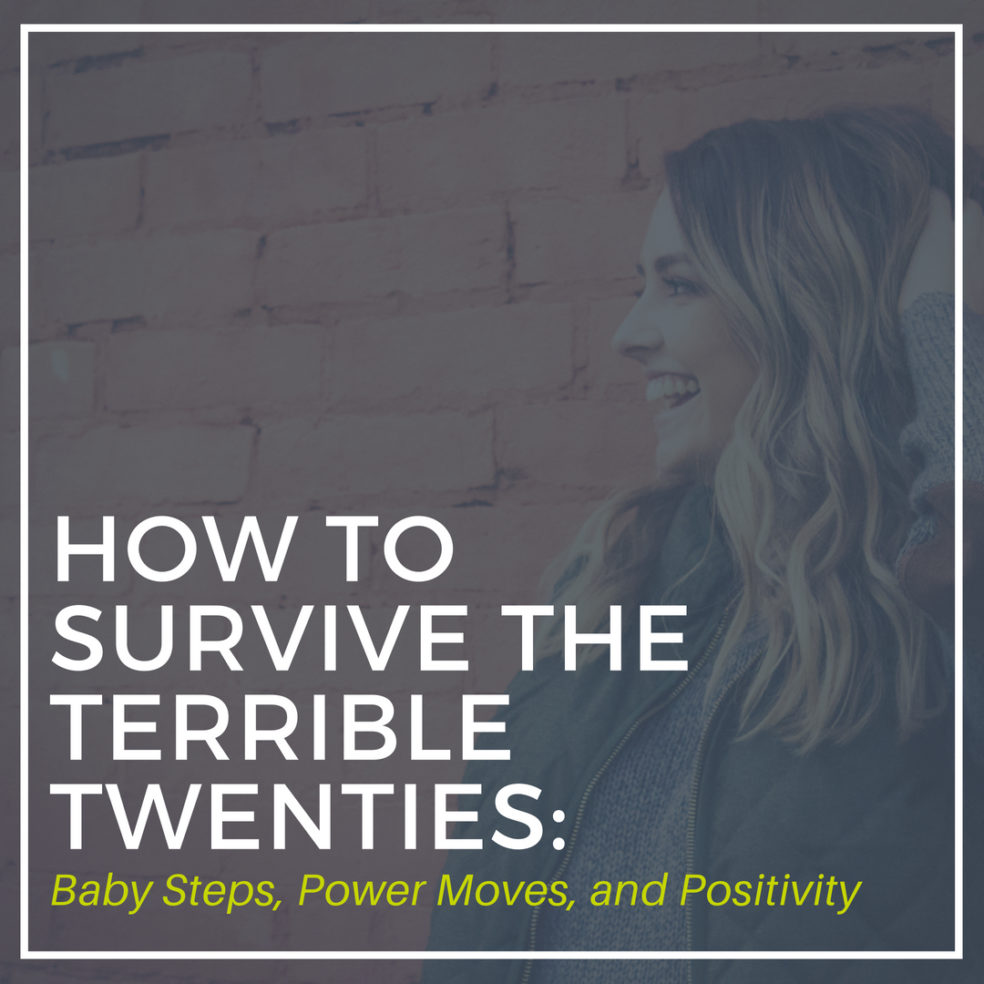How to Survive the Terrible Twenties: Baby Steps, Power Moves, and Positivity
You’ve done it. You’ve survived college: you mastered new exam formats, obtained all necessary credits and walked the plank in graduation gown and mortarboard.
Now what?
What lies on the other side of that graduation can be shocking. Some lucky souls slide into their planned careers without complication. I was not one of those. There was no job waiting for me on the other side. I didn’t even know what I wanted to do. I was about as clueless as a college graduate can be.
I had slammed face-first into a wall of uncertainty. Many of you know how it feels: You can’t find a job and if you do, it’s not in your preferred field and might not require a college degree. But you have to pay the bills, so you take what’s available. Good for you. But beware of the trap of settling into something that you don’t want long-term. Don’t let the passage of time and the monotony of the day-to-day rob you of your career goals.
Here’s the secret no one told you: The terrible twenties are a rite of passage that you must survive in order to thrive. There’s nothing wrong with you. If you are in a kind of no man’s land not knowing where to turn, welcome to the club!
I eventually made it to the other side, and quite a shock to me—I ended up becoming an undercover intelligence officer in the CIA. (I often joke, “I couldn’t get a job until I got hired by the CIA!”) It all worked out in the end, but I would have never gotten that job without the long, uphill struggle that eventually pushed me into my place of purpose.

Here’s a Guide for Surviving Your Terrible Twenties:
- Explore your options. Ask a lot of questions.
After graduation, my “holding job” was an administrative assistant position at a humanitarian agency in Washington, DC. Faxing, filing, and taking phone calls was not exactly my dream job, but it paid the bills. Meanwhile, it was a career I thought I might be interested in. I pestered my colleagues with a thousand questions: Do you like your job? What did you study? Why did you choose this job? How did you get this position? What’s the best part of your job? What’s the worst? Nobody rejected my quest for career insights. People love to talk about themselves and their experience and they want to help others find their way.
It turns out, the grant writing and administrative side of humanitarian work wasn’t my thing. However, what I learned about relief and development work was priceless. The time that I spent there was not useless or wasted time. The insights I gained while faxing and filing would be integral to a project my husband and I were involved with twenty years later to help Iraqis displaced by ISIS.
- Build your skills. Choose a topic that you love or an area of knowledge that fascinates you. Find a way to learn more.
While I was clueless about my future, I had this strong intuitive pull to study the Middle East. Therefore, I decided to study Arabic. I had been exposed to the Arabic language in my study abroad program in Cairo, but my knowledge was still quite limited. I bought an Arabic workbook and cassette tapes and started studying the language on my own. Then I discovered the most well-priced language courses in the DC area were offered by the USDA—The U.S. Department of Agriculture. (It sounds weird but it’s true! The USDA offers dozens of language courses at incredible rates.) I didn’t have much money, but I could afford to take these classes at night after work, so I did this for about a year. These small efforts probably don’t sound like much, but they were what I could do at that moment when I didn’t have any other direction. Baby steps are powerful—do not underestimate them!
- Choose a bold move and go for it. (What’s the worst that could happen? Nothing!)
Now, as you proceed, mix up the baby steps with bold moves. My bold move was applying to Georgetown University’s Arab Studies graduate program. I doubted I was smart enough for an Ivy League school like this, but I applied anyway. I didn’t have the academic credentials they typically sought, but all the baby steps I had taken must have been compelling to program administrators who accepted me into the two-year program. My “baby-steps strategy” worked. My resume was full of indicators that I was determined to live an adventurous life and had the interest and constitution to get off the beaten path: mission trips to numerous foreign countries, a study abroad program in Cairo and my efforts to continue learning Arabic.
- Get ahold of positive materials (books, podcasts, articles) and feed your soul.
Limit unfocused social media intake while feeding your mind and spirit with uplifting messages of hope and positivity. This is not a step you can afford to skip. Surround yourself with people who share the same goals. Hang out with people who will lift you up. Trust me when I say that you are going to need this support to survive post-graduation depression that threatens to take hold in the face of challenges and uncertainty.
Social media is not your friend in these moments. The images you see on Facebook, Instagram, and Twitter foster the myth that success is easy, fast, and made possible by the wonders of great branding and modern marketing tools. “Instagram success,” the well-packaged portfolio of curated images, is not real success. Any hints of the time and effort involved in building your expertise and honing your craft are rarely captured by the camera. Therefore, we think that if there’s struggle involved in moving ourselves forward, there must be something wrong with us. Don’t be fooled by “manufactured success” but instead focus on developing a real, world-changing kind of knowledge base.
Success is the accumulation of singular, small steps that imperceptibly take you in the direction of your dreams. And at the right time, your bold moves either set you on the right course and/or launch you into the stratosphere. I am proof that the people who may be slow getting started are not doomed to failure—We just need a little extra time to percolate, to prepare ourselves for the crazy ride.
-Michelle



